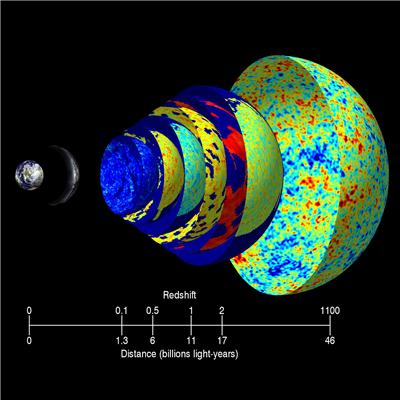A two-year study conducted by a team of astronomers from the University of Portsmouth and LMU University Munich indicate the probability of existence of dark energy in the universe to be 99.9996%.
 A visual impression of the data used in the study. The relevant extra-galactic maps are represented as shells of increasing distance from Earth from left to right. (Credits: Earth: NASA/BlueEarth; Milky Way: ESO/S. Brunier; CMB: NASA/WMAP)
A visual impression of the data used in the study. The relevant extra-galactic maps are represented as shells of increasing distance from Earth from left to right. (Credits: Earth: NASA/BlueEarth; Milky Way: ESO/S. Brunier; CMB: NASA/WMAP)
Dark energy is a mystifying material that is considered to be responsible for accelerating the expansion of the universe. The findings of the study led by Robert Crittenden and Tommaso Giannantonio are published in the Royal Astronomical Society’s Monthly Notices journal. According to Portsmouth team member, Professor Bob Nichol, even though they have been unable to determine the composition of the dark energy, the team is confident of the existence of this matter as a result of their study.
When the acceleration in the expansion of the universe was first observed a decade ago by astronomers studying the brightness of supernovae, it was attributed to the repulsive force exerted by dark energy. Though the discoverers of this phenomenon were awarded the 2011 Nobel Prize for Physics, the existence of dark energy is still debatable. The many techniques that were devised to validate the existence of dark energy are all either bogged down by their own ambiguities or are the accelerating universe’s indirect probes. Clear validation of dark energy can be obtained from the Integrated Sachs Wolfe effect according to which light from the cosmic microwave background generated by the residual heat from the Big Bang would turn slightly blue on passing through gravitation fields generated by chunks of matter. Astronomers Neil Turok and Robert Crittenden built on this premise to observe for minute changes in light energy by drawing comparisons of radiation temperature using maps of local galaxies. The absence of dark energy would prohibit correspondence between two maps whereas its existence would lead to the light from the cosmic microwave background gaining energy as it traverses big chunks of mass. The signal detected from the first observation of the Integrated Sachs Wolfe effect was too weak to be considered as strong evidence for dark energy. The new study reviews the arguments not in favor of this effect and also enhances the maps used in the original study.